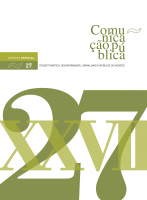As fontes dos serviços de fact-checking luso-brasileiros
DOI:
https://doi.org/10.4000/cp.5348Palavras-chave:
fact-checking, fake news, ciberjornalismo, fontesResumo
Os serviços de fact-checking, que têm suas origens ligadas à década de 1980, ganharam força e tamanho a partir das polêmicas fake news utilizadas durante as eleições americanas de 2016 e o Brexit, no mesmo ano. Este trabalho se propõe investigar as características de fontes das iniciativas do Brasil (Truco, Lupa, e Aos Fatos) e de Portugal (o Fact Check do Observador) devidamente credenciadas pela International Fact-Checking Network (IFCN). Os resultados obtidos foram devidamente detalhados no terceiro tópico deste artigo, que traz considerações interessantes sobre as características das fontes dos websites analisados, sendo um dos resultados que os serviços de fact-checking do Brasil e de Portugal se concentram em três tipos diferentes de fontes de notícia.
Downloads
Referências
Alsina, M. (2009). A Construção da Notícia. Petrópolis, Brasil: Vozes.
Assis, M. (1984, 14 de novembro). Ao Acaso. Diário do Rio de Janeiro, p. 12.
Bastos, H. (2012). A diluição do jornalismo no ciberjornalismo. Jornalismo e Conhecimento, 9, 284-298.
Bardin, L. (2011). Análise de conteúdo. São Paulo, Brasil: Edições 70.
Dobbs, M. (2012). The Rise of Political Fact-checking. Washington, D.C., Estados Unidos da América: New America Foundation.
Harsin, J. (2018). A critical guide to fake news: From comedy to tragedy. Pouvoirs, 164, 99-119.
Kapferer, J. (1993). Boatos: o mais antigo mídia do mundo. Rio de Janeiro, Brasil: Forense Universitária.
Laville, C., & Dionne, J. (2007). A Construção do Saber- Manual de metodologia da pesquisa em ciências humanas (revisão técnica e adaptação da obra: Lana Mara Siman). Belo Horizonte, Brasil: Editora UFMG.
Ramirez, E. (2010). La especialización en el periodismo: Formarse para informar. Sevilha/Zamora, Espanha: Comunicacíon Social Ediciones y Publicaciones.
Rosenstiel, T. (2013). The New Ethics of Journalism: Principles for the 21st Century. Los Angeles, Estados Unidos da América: The Poynter Institute.
Schmitz, A. (2011). Fontes de Notícias – Ações Estratégicas das fontes do Jornalismo. Florianópolis, Brasil: Combook.
Tambosi, O. (2005). Informação e conhecimento no jornalismo. Jornalismo e Conhecimento, 2, 31-38.
Tardáguila, C. (2018, 10 de fevereiro). É uma obrigação desafiar mentira dos políticos, diz Brooks Jackson. O Globo. Disponível em <http://blogs.oglobo.globo.com/preto-no-branco/post/uma-obrigacao-desafiar-mentira-dos-politicos-diz-brooks-jackson-554727.html> [Consult. em 10 de Agosto de 2019].
Traquina, N. (2001). O estudo do jornalismo no século XX. São Leopoldo, Brasil: Unisinos.
Verstraete, M., Bambauer, D., & Bambauer, J. (01 de agosto de 2017). Identifying and Countering Fake News. Disponível em: <https://law.arizona.edu/report-identifying-and-countering-fake-news?_ga=2.242576577.234832335.1531496464-1029608053.1531496464: https://law.arizona.edu/report-identifying-and-countering-fake-> [Consult. em 22 de junho 2019].
Victor, F. (2017, 20 de dezembro). Noticias falsas existem desde o século 6, afirma historiador Robert Darnton. Folha de São Paulo. Disponível em: <https://www1.folha.uol.com.br/ilustrissima/2017/02/1859726-noticias-falsas-existem-desde-o-seculo-6-afirma-historiador-robert-darnton.shtml> [Consult. em 17 de julho de 2019].
Wardle, C. & Derakshan, H. (2017). Information Disorder: Toward an interdisciplinary framework for research and policy making. Council of Europe.
Downloads
Publicado
Edição
Secção
Licença
Direitos de Autor (c) 2019 Copyright (c) 2019 Author

Este trabalho encontra-se publicado com a Licença Internacional Creative Commons Atribuição-NãoComercial 4.0.
Os conteúdos da Comunicação Pública estão licenciados com uma licença Creative Commons - Atribuição-NãoComercial 4.0 Internacional.




